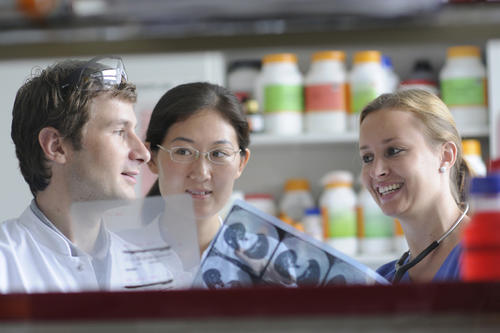Strategies against Cancer
Experts from various fields of medicine, biology, chemistry, and computer science as well as the humanities and social sciences are working together in the new graduate school to train new specialists in the fight against cancer.
Image Credit: Charité - Universitätsmedizin Berlin
The study of cancer and the development of new therapies is a prominent research focus of the Berlin School of Integrative Oncology at Charité - Universitätsmedizin Berlin, the joint medical school of Freie Universität Berlin and Humboldt-Universität zu Berlin.
News from Jun 17, 2015
With around 1.45 million people in Germany already afflicted and 450,000 new diagnoses per year, cancer represents a major medical and social challenge. The study of cancer, including an analysis of the molecular mechanisms and the development of new treatment options, is thus one of the main areas of research at Charité - Universitätsmedizin Berlin, the medical school operated jointly by Freie Universität Berlin and Humboldt-Universität zu Berlin.
This research focus has gained a new impetus through the establishment of a new graduate school, the Berlin School of Integrative Oncology (BSIO), as part of the German government’s Excellence Initiative. In addition to the two host universities, Freie and Humboldt, the other involved partners are the Max Delbrück Center for Molecular Medicine, the Max Planck Institute for Molecular Genetics, the Max Planck Institute of Molecular Plant Physiology, the Leibniz Institut für Molekulare Pharmakologie, and the Hertie School of Governance. The spokesperson for BSIO is Professor Clemens Schmitt, director of the Molecular Cancer Research Center at Charité and Executive clinical consultant at the Division of Hematology, Oncology, and Tumor Immunology at Charité.
Within the BSIO, more than 50 researchers from the fields of hematology, oncology, genetics, biochemistry, surgery, radiology, computer science, the humanities, and social sciences are working together to create a particularly closely integrated graduate education for prospective molecular oncologists and physician-scientists interested in cancer research.
The graduate school called for applications for doctoral positions for candidates with a background in the natural and medical sciences for the first time in 2012. Currently applications for the fourth application period are being processed. The closing date for applications is July 1, 2015. For further information, see www.bsio-cancerschool.de.
This interdisciplinary approach will equip graduate students with the necessary knowledge and tools to develop novel methods for the detection of cancer as well as new therapy strategies. The intensive exchange between research in basic sciences and clinical application aims to accelerate the development of therapies for patients. Likewise, experimental laboratory research can give priority to the most urgent issues in clinical cancer treatment.
Freie Universität is home to seven graduate schools funded through the German Excellence Initiative:
- Berlin-Brandenburg School for Regenerative Therapies (BSRT)
- Berlin Graduate School Muslim Cultures and Societies
- Berlin Mathematical School
- Berlin School of Integrative Oncology
- Friedrich Schlegel Graduate School of Literary Studies
- Graduate School of East Asian Studies
- Graduate School of North American Studies

